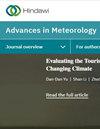改进协方差定位以减小集成数据同化带来的采样误差
IF 2.1
4区 地球科学
Q3 METEOROLOGY & ATMOSPHERIC SCIENCES
引用次数: 0
摘要
基于集合的卡尔曼滤波器至少需要相当大的集合(例如,10000个成员)来识别多维地球物理系统在大距离处的相关误差协方差。然而,增加大量的系综大小将增大采样误差。本研究提出了一种基于协方差定位(CL)方案的改进的Cholesky分解,即一种具有改进的Cholsky分解(CL-MC)的协方差定位方案。我们的主要思想利用改进的Cholesky(MC)分解技术来估计背景误差协方差矩阵;同时,我们对背景误差协方差采用了可调谐奇异值分解方法,以提高系统的集成增量,避免系统的不平衡。为了验证所提出的方法是否能有效地降低采样误差,在Lorenz-96模型和大型模型(SPEEDY模型)上进行了数值实验。结果表明,对于不同的数据同化参数(系综大小和定位),CL-MC方法优于CL方法。此外,通过对SPEEDY模型进行一年的同化实验,发现CL获得的1天预测RMSE与CL-MC的5天预测RMSEs大致相等。因此,CL-MC方法在长期预测中具有潜在的优势。也许所提出的CL-MC方法在大气环流模型中具有良好的应用前景。本文章由计算机程序翻译,如有差异,请以英文原文为准。
Modifying Covariance Localization to Mitigate Sampling Errors from the Ensemble Data Assimilation
The ensemble-based Kalman filter requires at least a considerable ensemble (e.g., 10,000 members) to identify relevant error covariance at great distances for multidimensional geophysical systems. However, increasing numerous ensemble sizes will enlarge sampling errors. This study proposes a modified Cholesky decomposition based on the covariance localization (CL) scheme, namely a covariance localization scheme with modified Cholesky decomposition (CL-MC). Our main idea utilizes a modified Cholesky (MC) decomposition technique for estimating the background error covariance matrix; meanwhile, we employ the tunable singular value decomposition method on the background error covariance to improve the ensemble increment and avoid the imbalance of the system. To verify if the proposed method can effectively mitigate the sampling errors, numerical experiments are conducted on the Lorenz-96 model and large-scale model (SPEEDY model). The results show that the CL-MC method outperforms the CL method for different data assimilation parameters (ensemble sizes and localizations). Furthermore, by performing one year of assimilation experiments on the SPEEDY model, it is found that the 1-day forecast RMSEs obtained by the CL are approximately equal to the 5-day forecast RMSEs of CL-MC. So, the CL-MC method has potential advantages for long-term forecasting. Maybe the proposed CL-MC method achieves good prospects for widespread application in atmospheric general circulation models.
求助全文
通过发布文献求助,成功后即可免费获取论文全文。
去求助
来源期刊

Advances in Meteorology
地学天文-气象与大气科学
CiteScore
5.30
自引率
3.40%
发文量
80
审稿时长
>12 weeks
期刊介绍:
Advances in Meteorology is a peer-reviewed, Open Access journal that publishes original research articles as well as review articles in all areas of meteorology and climatology. Topics covered include, but are not limited to, forecasting techniques and applications, meteorological modeling, data analysis, atmospheric chemistry and physics, climate change, satellite meteorology, marine meteorology, and forest meteorology.
 求助内容:
求助内容: 应助结果提醒方式:
应助结果提醒方式:


